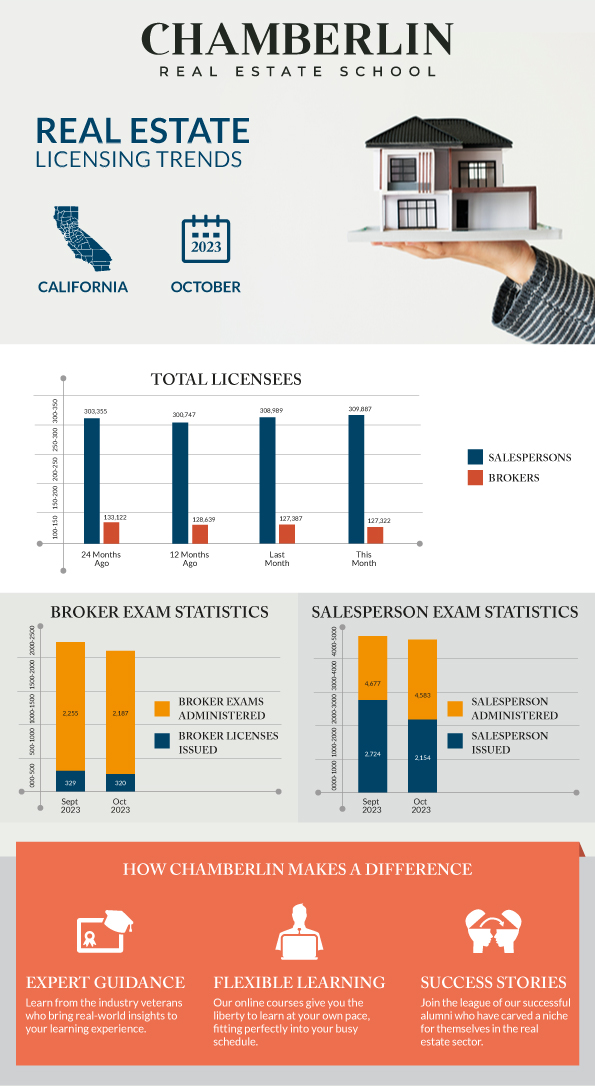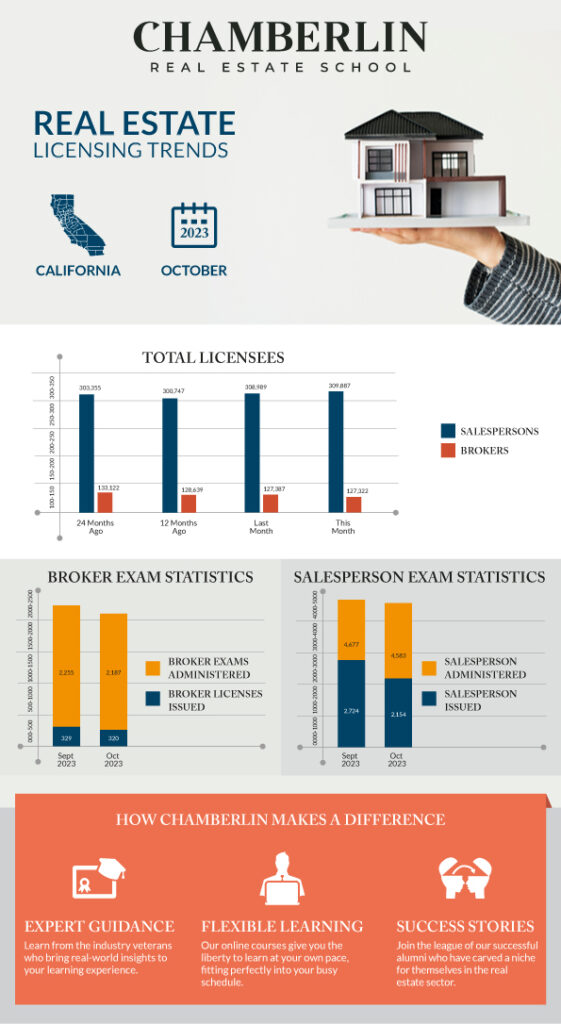Real estate investing remains a top method for generating income and building wealth, appealing to those aiming to create passive income, diversify their investment portfolio, or attain financial freedom. This investment avenue can serve as your ladder to achieving these ambitions.
Beginning this lucrative venture might seem daunting at first. One way to simplify the process is by obtaining a real estate license. This not only equips you with a thorough understanding of market dynamics, property laws, and transaction processes but also opens doors to exclusive listings and networking opportunities with industry professionals. By enrolling in our online courses at Chamberlin Real Estate School, you can gain the knowledge and credentials needed to navigate the real estate market confidently.
This guide is crafted for beginners eager to explore the area of real estate investments. Here, we’ll discuss various investment types within real estate, the vital skills for success, strategies to enhance returns, and a realistic look at the potential risks and rewards. Additionally, we will outline the initial steps necessary to venture into real estate investing.
After reading this article, you’ll possess a thorough understanding and the confidence needed to start your investment path in real estate. But first, let’s clarify what real estate investing entails and the reasons to consider it.
Understanding Different Types of Real Estate Investments
Real estate encompasses a wide array of property types and assets, each offering different opportunities based on your investment goals, budget constraints, and appetite for risk. Whether you’re looking to dive into one category or diversify across several, the field of real estate is rich with potential.
Residential Real Estate
Residential real estate covers properties designed for living purposes, including single-family homes, multifamily units, apartments, condos, and townhouses. Investors in this sector often purchase properties to rent them out, aiming for rental income and property value appreciation over time. While residential real estate can be an optimal starting point for newcomers due to its relative accessibility, it demands ongoing management, upkeep, and adherence to legal standards. If you’re planning to invest in this sector, having a real estate license can give you an edge. It allows you to legally manage your properties, access the Multiple Listing Service (MLS) for better deals, and enhance your credibility with tenants and partners. Consider getting licensed through our comprehensive online courses to maximize your investment potential.
Commercial Real Estate
Properties utilized for business operations, such as office spaces, retail outlets, hotels, eateries, and warehouses, fall under commercial real estate. Investors here tend to lease spaces to businesses, securing rent payments, often under long-term agreements, leading to substantial returns. Though commercial real estate generally presents higher costs and complexity compared to its residential counterpart, it also provides a pathway to greater financial stability and portfolio diversification.
Land
This category includes undeveloped or semi-developed parcels of land, free from any structures. Investors in land might hold onto it for price appreciation or pursue development for residential or commercial projects, alternatively selling to developers or construction firms. Land investments can be highly profitable but carry significant risks and challenges, including substantial upfront costs and environmental considerations.
Real Estate Investment Trusts (REITs)
Real Estate Investment Trusts, or REITs, are entities that own, manage, or finance income-generating real estate. By purchasing shares in REITs, investors can engage in real estate endeavors indirectly, akin to investing in stocks or mutual funds. REITs open the door to real estate investment without the burdens of direct property management, accompanied by benefits like regular dividend payments and certain tax efficiencies. For those interested in the broader aspects of real estate careers, our post on Is Real Estate The Right Career Path For You? Exploring The Pros And Cons offers a comprehensive overview.
Essential Skills for Every Real Estate Investor
Real estate investing demands a thorough skill set, encompassing knowledge, talent, organization, networking, and perseverance. Achieving success in this competitive field hinges on the mastery of key skills, empowering you to make informed and lucrative investment decisions.
Market Analysis
At the core of effective real estate investing is the capability to conduct thorough market analysis. This involves researching and interpreting the current and future market trends, understanding supply and demand dynamics, analyzing demographics and competition, and assessing the opportunities and risks in your target market. Mastering market analysis enables you to pinpoint the prime locations, properties, and investment strategies.
Financial Analysis
Essential to real estate investment is financial analysis—the skill to assess the financial standing and potential of your investments. It’s crucial to be adept at calculating and deciphering key financial metrics, including cash flow, return on investment (ROI), net present value (NPV), internal rate of return (IRR), and capitalization rate (cap rate). Proficiency in financial analysis is vital for evaluating the value, profitability, and viability of your investment endeavors.
Negotiation Skills
Negotiation skills are paramount, enabling you to engage effectively and convincingly with various stakeholders in a real estate deal. Effective negotiation involves the ability to establish rapport, listen actively, pose questions, address objections, and seal deals successfully. Honing your negotiation skills can significantly impact securing advantageous pricing, terms, and conditions for your investments.
Property Management
Expertise in property management is instrumental in sustaining and enhancing the value of your real estate holdings. This includes the capability to locate and vet tenants, manage rent collection, oversee repairs and maintenance, address tenant complaints and issues, and ensure compliance with relevant laws and regulations. Effective property management is key to boosting rental income, minimizing expenses, and avoiding legal issues.
Legal Compliance
Legal compliance entails grasping and adhering to the myriad of rules and regulations that are pivotal in the real estate sector. It’s essential to be well-versed in the specific laws and codes relevant to your properties. This includes areas such as zoning, building, environmental, tax, and contract laws.
By ensuring legal compliance, you safeguard your investments from potential fines, penalties, and lawsuits, not to mention disputes that could otherwise put your assets at risk.
Strategies for Successful Real Estate Investing
Real estate offers diverse investment opportunities, each presenting unique benefits and challenges. Whether you’re driven by specific financial goals, have a set budget, or a certain level of risk tolerance, there’s a strategy that can cater to your requirements, helping you to increase your wealth and achieve your investment objectives.
Long-term Rentals
Investing in long-term rentals involves purchasing properties to lease to tenants for extended periods, typically over a year. This approach can provide you with a steady source of passive income through rent payments, tax deductions, and property depreciation, alongside the potential for property value appreciation over time. For those interested in long-term rental investments, obtaining a real estate license can be particularly beneficial. It not only enhances your market knowledge and negotiation skills but also allows you to handle leasing and property management independently. This can lead to cost savings and greater control over your investments. Learn more about the benefits of getting licensed and how it can streamline your investment process through our specialized courses.
This strategy is ideal for investors looking to establish a reliable cash flow, who possess the patience and management capabilities for handling property and tenant issues, and who have the necessary capital and credit for property acquisition and upkeep.
Flipping Properties
Property flipping is about acquiring underpriced or distressed properties, refurbishing them, and then selling them at a profit, generally within a year. This method can yield significant one-time profits, capitalize on market trends and opportunities, and utilize your innovative skills and property value enhancement expertise.
It’s best suited for investors experienced in identifying promising deals, those who have the financial resources for buying and renovating properties, and who can devote the time and effort to oversee projects and finalize sales. For those considering flipping houses, our post on Do You Need A Real Estate License To Flip Houses? provides essential information.
Wholesaling
Wholesaling involves locating properties from sellers eager to sell, then transferring or selling these contracts to other investors for a commission or profit margin. This strategy enables you to earn without the need for direct property ownership or financial involvement, minimizes your risk and responsibility, and allows for rapid business expansion.
It’s appropriate for investors with strong networking and marketing capabilities to generate leads, excellent negotiation and communication skills for sealing deals, and a solid understanding of the legal and ethical aspects necessary for industry compliance.
Real Estate Crowdfunding
Real estate crowdfunding pools funds from various investors to finance real estate projects or portfolios, often facilitated through online platforms. This method offers entry into varied real estate sectors—including residential, commercial, industrial, or land—with minimal capital, benefits from the expertise of professional management, and appreciates the substantial returns and tax benefits of real estate.
Investors seeking a more passive real estate investment route, who are diligent in opportunity assessment and risk analysis, and who are patient and trustful enough to invest collaboratively will find this strategy fitting.
Risks and Rewards of Real Estate Investing
Investing in real estate comes with its share of uncertainties, complexities, and responsibilities, making it far from a risk-free venture. On the flip side, it promises significant benefits like income generation, property appreciation, and appealing tax advantages.
This part of our discussion highlights the predominant risks and rewards associated with real estate investments, aiming at a balanced perspective.
Risks
Here are some prevalent risks tied to real estate investments:
- Market risk: Influenced by numerous factors including supply and demand, economic scenarios, interest rates, demographics, and regulatory policies, the real estate market is prone to unpredictable fluctuations. These variations can directly impact the valuation, the potential for rent, and the profitability of your properties.
- Location risk: The appeal and demand for your property heavily rely on its location. A less desirable location can lead to reduced rental income, higher vacancy rates, and diminished property value. It’s crucial to rigorously research the neighborhood, available amenities, crime statistics, and future development plans of the area you plan to invest in.
- Negative cash flow: When the expenses of maintaining a property surpass the income it generates, negative cash flow occurs. Factors such as substantial maintenance costs, unexpected repairs, vacancies, issues with tenants, or decreased rental prices can contribute to this undesired situation. Negative cash flow can deplete your financial reserves and impede your capacity to cover mortgage and tax obligations.
- Property management: Encompassing maintenance, tenant acquisition and screening, rent collection, resolving complaints, and adhering to legal standards, property management demands considerable time, patience, and financial outlay. Opting for a professional property manager or delegating some responsibilities can erode your profit margins, though it might ease the operational burden.
- Legal compliance: Real estate investment is governed by a myriad of laws and regulations at the federal, state, and local levels. These legal frameworks, encompassing zoning, construction, environment, taxation, and contractual obligations, require your strict compliance to avert fines, penalties, litigations, and disputes that could put your investment at risk.
Rewards
Real estate investments are known for these attractive rewards:
- Rental income: One of the primary incentives of real estate investment is the rental income from tenants. This income stream can provide a reliable and continuous cash flow that may not only cover your expenses but also yield a profit. Additionally, rental income has the potential to rise over time through rent adjustments or property enhancements.
- Property appreciation: Over time, the value of your property can appreciate due to market trends, inflation, or strategic improvements. This appreciation boosts your equity, potentially enabling you to sell your property at a premium or secure more favorable refinancing options.
- Tax advantages: The tax system extends various benefits to real estate investors, such as deductions on mortgage interest, property taxes, depreciation, and operational expenses. Moreover, opportunities for exemptions or deferments on capital gains, passive income, and provisions for 1031 exchanges can significantly enhance the investment’s attractiveness.
Getting Started: Steps for Novice Investors
Starting on a real estate investing path requires preparation, clear vision, and strategic planning. To aid beginner investors in initiating their path in real estate, here are key steps to follow.
- Set your goals: Begin by outlining your investment objectives in real estate. Determine what you aim to achieve, your desired financial gain, investment duration, and your risk tolerance. Setting clear goals will guide you in selecting the most suitable strategy, market, and property for your investment.
- Educate yourself: Acquaint yourself with real estate investing fundamentals, including terminology, concepts, methods, and applicable laws. Enhancing your knowledge through books, blogs, podcasts, articles, courses, seminars, webinars, and participating in online forums and communities is vital for making informed decisions.
- Organize your finances: Assess your financial situation, including income, expenses, assets, liabilities, and credit score, to determine your investment capacity. Decide on your financing method, whether through cash, loans, partnerships, or other means, and ensure you have reserves for unforeseen costs.
- Get pre-approved: If you plan to finance your investment, securing pre-approval for a mortgage or loan is essential. Pre-approval provides insight into your borrowing capacity, interest rate, and terms, demonstrating your seriousness and qualification to sellers and agents, thus strengthening your position in negotiations.
- Find your niche: Identify a real estate investment niche that aligns with your goals, budget, and skills. Whether it’s residential, commercial, land, or REITs, or strategies like long-term rentals, flipping, wholesaling, or crowdfunding, focusing on a niche enhances your expertise.
- Choose your market: Selecting the right market is essential for identifying profitable investment opportunities. Research to understand market dynamics such as supply and demand, demographics, and competition, along with factors impacting property value and rentability like economic conditions, infrastructure, and development plans.
- Pick a neighborhood: Narrow your property search to a specific neighborhood within your chosen market. By evaluating the area’s appeal, condition, and potential, and engaging with locals, agents, and landlords for insights, you can pinpoint the best investment deals and tenants. Our guide on 9 Cities In California All Aspiring Real Estate Agents Should Know In 2024 will be helpful.
- Analyze deals: Conduct thorough analyses of potential investment properties to assess their financial performance and potential. Key metrics to compare include cash flow, return on investment, net present value, internal rate of return, and cap rate, alongside inspecting the property and estimating repair and maintenance costs.
Final Thoughts
Real estate investing offers a promising avenue for generating income and building wealth. Nevertheless, it demands thorough preparation, extensive knowledge, and honed skills. Through this article, we’ve laid out key insights for beginners eager to invest in real estate.
We’ve discussed various investment types within real estate, essential skills for success, strategies to enhance your returns, and the expected risks and rewards. Moreover, we’ve outlined actionable steps to start your investment journey.
Armed with a robust understanding of real estate investing, you’re now poised to take proactive steps towards your investment goals. Remember, hands-on experience is invaluable—embrace mistakes as learning opportunities.
With continued practice, your proficiency and confidence as a real estate investor can lead to the lifestyle you’ve been dreaming of.










